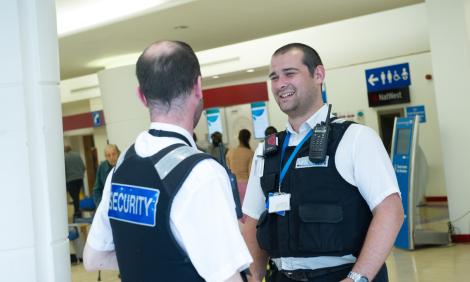Security staff
Security staff make sure that hospitals and other NHS sites are accessible and safe for patients, visitors and staff. They also protect buildings and valuable equipment.
This page has information on the role of security staff in the NHS, including entry requirements and skills needed.
Working life
The NHS takes security very seriously. Patients need to be kept safe while in hospital, so access must be limited to people with a genuine reason to be on hospital premises.
As a security officer, you'll be based close to the hospital entrance to monitor people going in and out. You will
- challenge anyone who is not a member of staff or a patient
- make sure visitors have a reason to be in the hospital
- ask official visitors to sign in and issue them with a pass
- deal with any incidents which might threaten the security of staff and patients
- where possible, diffuse potentially difficult situations
- call in police or other emergency services if required
- monitor CCTV
- patrol the outside of the hospital including the grounds
If you work as a security team leader, you will
- oversee the work of several security officers
- organise staff rotas and shifts
- deal with day-to-day staffing and security issues
As a security manager, you'll be responsible for the security of one or more NHS sites. As well as managing staff you will
- draw up security plans
- advise managers and clinical staff on security issues
- organise staff training
Where will I work?
Security team leaders and managers are office-based, but spend a lot of their time around the site, making sure everything is safe and secure and talking to staff.
Security staff may work for companies which provide security services to the NHS.
Entry requirements
There are no set entry requirements for security officers. Employers usually expect security staff to have some experience of security or customer service, particularly dealing with challenging situations. Employers may ask for relevant training. This can include qualifications required by the SIA (Security Industry Authority).
Employers expect a good standard of numeracy and literacy. They may ask for GCSEs (or equivalent) in English and maths. Employers may ask for a driving licence.
Staff joining the NHS as a team leader or manager need experience in security work or with a uniformed service such as the Army or police.
Skills needed
Security staff need to be
- able to understand a situation quickly
- calm in stressful situations
- confident and reassuring
- resilient in dealing with other people’s challenging behaviour
- able to follow procedures
- able to work alone or in a team
- prepared to go into unknown or unpredictable situations
- physically fit for walking and standing
- good communication skills
- teamwork skills
- customer service skills
Training and development
When you join the NHS in a security role, you will have an introduction to the hospital site, the departments and their systems and procedures. You will be expected to keep your skills and knowledge up to date by going on short courses on particular topics, such as conflict resolution or physical intervention.
Security staff can join the National Association for Healthcare Security.
-
Security staff working in the NHS are paid on the Agenda for Change (AfC) pay system. You would typically start on AfC band 2. With further training and experience, you could apply for more senior positions at band 3.
Security staff in the NHS work standard hours of around 37.5 a week. The work involves shifts which include early starts, evenings, nights and weekends.
Terms and conditions will usually be different for porters working outside of the NHS.
-
With experience, security officers can become team leaders supervising other security staff. With further experience, you could become a manager responsible for the security of a hospital, area or trust or be responsible for security and related areas such as health and safety and fire safety.
You may be able to move into other support services roles or into other areas such as estates.
-
Most NHS trusts advertise their vacancies on NHS Jobs. Some advertise on their own websites. You can find a list of NHS organisations on NHS Choices.
If you're applying for a role either directly in the NHS or in an organisation that provides NHS services, you'll be asked to show how you think the NHS values apply in your everyday work.





